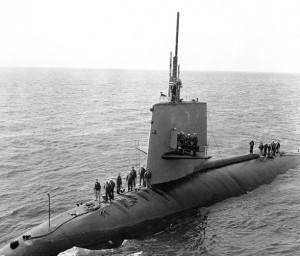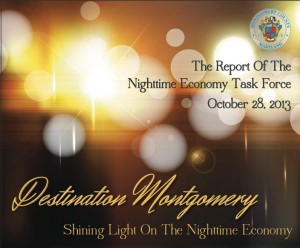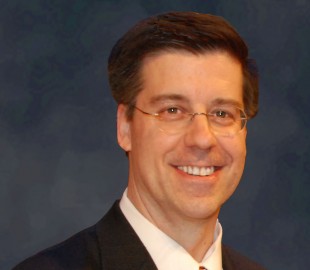
Lost Subs, Crowdsourcing & the Promise of Open Government
 On May 22, 1968, the nuclear submarine USS Scorpion disappeared without a trace somewhere in the North Atlantic. The U.S. Navy conducted an extensive search based on its last known whereabouts, but with no luck. With no options available, the U.S. government decided to take an unusual approach by ‘crowdsourcing’ the search for the submarine by asking for input from sea & weather experts, mathematicians, salvage experts and others from a diverse groups of backgrounds and specialties. While none of the individual guesses as to the sub’s whereabouts were on target, the cumulative information and average location provided a target area from where to search… and the sub was finally found.
On May 22, 1968, the nuclear submarine USS Scorpion disappeared without a trace somewhere in the North Atlantic. The U.S. Navy conducted an extensive search based on its last known whereabouts, but with no luck. With no options available, the U.S. government decided to take an unusual approach by ‘crowdsourcing’ the search for the submarine by asking for input from sea & weather experts, mathematicians, salvage experts and others from a diverse groups of backgrounds and specialties. While none of the individual guesses as to the sub’s whereabouts were on target, the cumulative information and average location provided a target area from where to search… and the sub was finally found.
This concept of the ‘wisdom of crowds’ has been around for a long time. One of the first published reports of the concept was in 1906, when the British statistician Francis Galton observed a country fair competition in which 800 people attempted to guess the correct weight of a dead ox. While most guesses were way too high or low, Galton took the average guess of each competitor and was astonished to find their collective attempts were amazingly accurate.
The dead ox weighed 1,198 pounds. The crowd’s average: 1,197.
The ‘wisdom of crowds’ centers on the theory that we all have our own individual biases, backgrounds and experiences, with resulting errors that can throw off our individual judgment. Yet there’s collective truth that, taken together, mitigates these errors and can make the crowds’ overall assessment amazingly accurate.
This week, NPR highlighted a suburban Maryland pharmacist named Elaine Rich, who along with thousands of other ordinary folks is part of the Good Judgment Project. This is an effort to see if ordinary citizens, using crowdsourced feedback and no special background or access to high-level data, can provide greater predictions on future world events than dedicated career intelligence officers with access to classified information. According to the report, ‘superpredictors’ like Rich (who are the elite of the citizen forecasters) can foretell world events 30 percent better than official analysts.
So, that’s great for assessing probability of the next global military hot spot or guessing the number of jelly beans in a jar. But what does this mean for us here in Montgomery County, and how can crowdsourcing improve outcomes for our community?
Over the past couple of years, there has been a lot of interest in the concept known as Open Government. Ask ten politicians what that means and you’ll probably get ten different answers, but basically Open Government initiatives strive to make the decision making process of government more transparent with information and data generated by the jurisdiction as openly available to the public as possible. The hope is that individuals, organizations and businesses will take this information and use it to enhance their understanding of the governing process, as well as participate and collaborate more.
The challenge in widening the circle of participation in Open Government initiatives, and take advantage of the ‘wisdom of crowds’, is that the vast majority of citizens feel they cannot make time for government participation, and/or their lone voice doesn’t make a difference and would simply be a waste of their time. Most have jobs and commutes and kids in school that suck their time and attention. Yet the fact is that issues of economic development (jobs), transportation (commutes) and public education (kids in school) are vitally important to our lives.
The core promise of Open Government SHOULD be to provide a friction-free environment where the public’s input should be easy to contribute AND make a difference in the decision making process.
 Just one example where crowdsourced feedback would be hugely beneficial here in Montgomery County would be to build up our ‘Nightime Economy’: food, drink and entertainment establishments that create jobs and enhance quality of life. Last year, county government and local business leaders established the ‘Nightime Economy Task Force’ that conducted a number of open Town Hall-style meetings to gather information from the public on how to keep county residents from heading across the DC and VA lines after the sun went down. While the goals for the task force were sound, how could the use of innovative social media platforms and other technology solutions been better-leveraged to exponentially grow crowdsourced ideas?
Just one example where crowdsourced feedback would be hugely beneficial here in Montgomery County would be to build up our ‘Nightime Economy’: food, drink and entertainment establishments that create jobs and enhance quality of life. Last year, county government and local business leaders established the ‘Nightime Economy Task Force’ that conducted a number of open Town Hall-style meetings to gather information from the public on how to keep county residents from heading across the DC and VA lines after the sun went down. While the goals for the task force were sound, how could the use of innovative social media platforms and other technology solutions been better-leveraged to exponentially grow crowdsourced ideas?
The wisdom of crowds only works when we actually HAVE a crowd participating.
We live in a county of a million people with incredible diversity of ages, cultures, careers, backgrounds and experiences to draw on. The challenges we face demand the cumulative knowledge of tens or hundreds of thousands of people to solve. We should not rely on elected officials or civil servants (as dedicated or gifted as they might be) to solve our problems. Our schools are overcrowded, our roads are clogged and our retail stores are closing at an alarming rate. Perhaps at its best, county government’s role should be to facilitate the ‘wisdom of crowds’ by implementing technologies that facilitate the free-flow of information and then promoting to the public the value of being a part of the problem-solving process.
Crowdsourcing is not the solution to every issue. Yet the collective wisdom of diverse people can help in finding more than just a lost submarine. It can lead us toward solutions that provide wise counsel as well as buy-in from those who will ultimately be impacted by decisions being made.


Really interesting Merlyn, thanks!
I think that you would be really interested in some of the most cutting-edge research that I have come across explaining crowds, open innovation, and citizen science.
http://papers.ssrn.com/sol3/cf_dev/AbsByAuth.cfm?per_id=1919614
And you may also enjoy this blog about the same too:
https://thecrowdsociety.jux.com/
Powerful stuff, no?
Very interesting materials, indeed. Thanks so much for sharing these links!